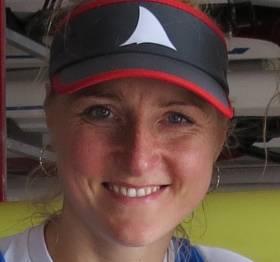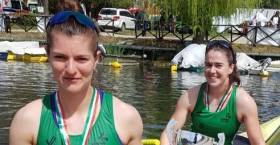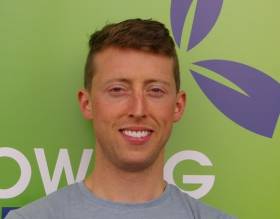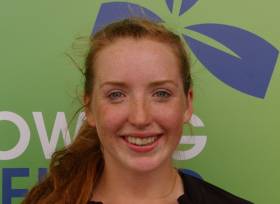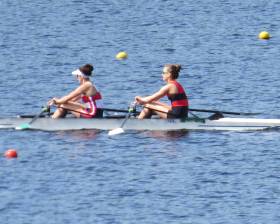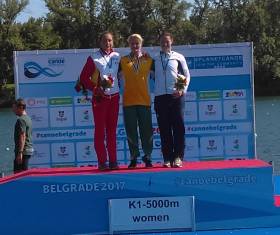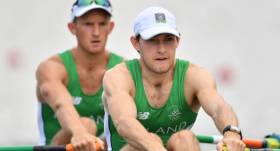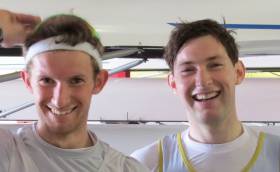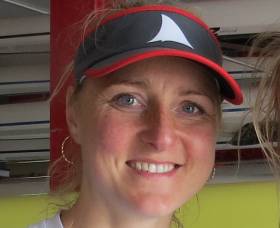Displaying items by tag: Belgrade
Puspure Opens With Commanding Win at World Cup Rowing
#Rowing: Sanita Puspure booked her places in the semi-finals of the World Cup in Belgrade with a commanding win in her heat. The Ireland single sculler had a slight lead by the 500 metre mark over Diana Dymchenko of the Ukraine. Puspure extended her advantage by halfway and then moved clear in the second 1,000 metres. Carling Zeeman of Canada tried to push into the second – and final – qualifying spot but could not get past Dymchenko, who finished almost nine seconds behind Puspure.
World Cup Regatta, Belgrade (Irish interest)
Men
Pair – Heat Four (Winner to A/B Semi-Finals; rest to repechage): 1 Czech Republic 6:41.22; 2 Spain 6:48.03, 3 China One 6:51.79, 4 Ireland (M O’Donovan, S O’Driscoll) 6:51.91.
Women
Pair – Heat One (First Three to A/B Semi-Finals; rest to repechage): 1 Britain One 7:19.05, 2 Britain Two 7:22.92, 3 Ireland (A Keogh, E Hegarty) 7:23.77.
Double Sculls – Heat Three (First Three to A/B Semi-Finals; rest to repechage): 1 Netherlands 7:10.90, 2 China One 7:16.89, 3 Ireland (A Crowley, M Dukarska) 7:20.40.
Single Sculls – Heat One (First Two to A/B Semi-Finals; rest to repechage): 1 Ireland (S Puspure) 7:50.48, 2 Ukraine (D Dymchenko) 7:59.30.
#Rowing: Ireland’s women’s double scull of Aileen Crowley and Monika Dukarska qualified directly for the semi-finals of the World Cup in Belgrade this morning. They took the third of the three places of offer in their heat. The Netherlands won well and China One, who had led in the first quarter, took second. Dukarska and Crowley were third through most of the race but had just 3.4 seconds to spare over Switzerland at the finish line.
World Cup Regatta, Belgrade (Irish interest)
Men
Pair – Heat Four (Winner to A/B Semi-Finals; rest to repechage):
1 Czech Republic 6:41.22; 2 Spain 6:48.03, 3 China One 6:51.79, 4 Ireland (M O’Donovan, S O’Driscoll) 6:51.91.
Women
Pair – Heat One (First Three to A/B Semi-Finals; rest to repechage): 1 Britain One 7:19.05, 2 Britain Two 7:22.92, 3 Ireland (A Keogh, E Hegarty) 7:23.77.
Double Sculls – Heat Three (First Three to A/B Semi-Finals; rest to repechage): 1 Netherlands 7:10.90, 2 China One 7:16.89, 3 Ireland (A Crowley, M Dukarska) 7:20.40.
#Rowing: Mark O’Donovan and Shane O’Driscoll took fourth in their heat of the pair at the World Cup Regatta in Belgrade this morning. Only the winner nailed down a place in the semi-final and the Czech Republic took this after a battle with Spain. Well behind them, China One won their battle with O’Donovan and O’Driscoll.
The Irish, the world champions in the lightweight pair, are hoping to establish themselves as a heavyweight pair. They were 13th of the 22 contenders on time.
World Cup Regatta, Belgrade (Irish interest)
Men
Pair – Heat Four (Winner to A/B Semi-Finals; rest to repechage):
1 Czech Republic 6:41.22; 2 Spain 6:48.03, 3 China One 6:51.79, 4 Ireland (M O’Donovan, S O’Driscoll) 6:51.91.
Women
Pair – Heat One (First Three to A/B Semi-Finals; rest to repechage): 1 Britain One 7:19.05, 2 Britain Two 7:22.92, 3 Ireland (A Keogh, E Hegarty) 7:23.77.
#Rowing: Ireland’s new pair of Emily Hegarty and Aifric Keogh put in a decisive sprint in the final 200 metres to take a crucial third place in their heat at the World Cup Regatta in Belgrade this morning. Britain took the first two qualification places for the semi-finals. For much of the race, Serbia held third, with Ireland lagging behind by over a length in fourth and set to go to a repechage. However, Ireland finished well and passed the hosts.
World Cup Regatta, Belgrade (Irish interest)
Women
Pair – Heat One (First Three to A/B Semi-Finals; rest to repechage): 1 Britain One 7:19.05, 2 Britain Two 7:22.92, 3 Ireland (A Keogh, E Hegarty) 7:23.77.
Ireland Rowing Team Chosen
#Rowing: The team which will represent Ireland at the World Cup in Belgrade (June 1st to 3rd) has been chosen. The selection was made after trials at the National Rowing Centre in Cork last weekend.
Belgrade is the first in a series of three World Cup regattas which culminate in the final World Cup in Lucerne from July 13th to 15th. This year, Rowing Ireland plans to send athletes to Belgrade and Lucerne.
In addition to the senior team competing in Belgrade, a training squad of athletes to be based at the National Rowing Centre in Cork has been announced.
Six rowers have also been selected to train for the Junior World Championships.
Ireland Team for World Cup Regatta, Belgrade, June 1st to 3rd:
Men
Pair: Mark O’Donovan, Shane O’Driscoll
Lightweight Double Sculls: Gary O’Donovan, Paul O’Donovan
Women
Pair: Emily Hegarty, Aifric Keogh
Double Sculls: Monika Dukarska, Aileen Crowley
Lightweight Double Sculls: Denise Walsh, Margaret Cremen
Single Scull – Sanita Puspure
Training Group to be based at National Rowing Centre:
Heavyweight Men: Andy Harrington, Patrick Boomer, Philip Doyle, Ronan Byrne.
Heavyweight Women: Tara Hanlon, Natalie Long.
Pre-Selected Rowers who will train for the Junior World Championships:
Men’s Quadruple: Jack Keating, Jack Dorney, Alex Byrne, Luke Nally-Hayes.
Women’s Double Scull: Ciara Moynihan and Ciara Browne.
Jenny Egan Takes Bronze at World Cup in Serbia
#Canoeing: Ireland’s Jenny Egan took a bronze medal at the canoe sprint World Cup in Belgrade in Serbia today. Australia’s Alyssa Bull took the gold in the K1 5,000 metres from Laia Pelachs of Spain.
Egan (30) started her season with a win in the K1 5,000 at the first World Cup in Montemor-O-Velho in Portugal. She also competed in the second World Cup in Szeged in Hungary.
Canoe Sprint World Cup, Belgrade (Selected Results; Irish interest)
Women
K1 5,000 – Final: 1 Australia (A Bull) 22 minutes 26.080 seconds, 2 Spain (L Pelachs) 22:27.83, 3 Ireland (J Egan) 22:35.60.
#Rowing: Paul and Gary O’Donovan took fourth place in the A Final of the lightweight double sculls at the World Cup Regatta in Belgrade today. The British crew of Peter Chambers and Will Fletcher took the race on from the start and led by a length at half way.
They come under pressure from the Czech Republic and Ireland in the second half, but in a scrambling finish the British held on for gold, with the Czechs second and Poland holding off Ireland for bronze.
World Cup Regatta, Belgrade (Selected results; Irish interest)
Men
Lightweight Pair – Final: 1 Ireland (M O’Donovan, S O’Driscoll) 6:46.65, 2 Russia 6:47.67, 3 Britain (J Cassells, S Scrimgeour) 6:48.40.
Lightweight Double Sculls – A Final: 1 Britain (P Chambers, W Fletcher) 6:25.67, 2 Czech Republic 6:26.27, 3 Poland 6:26.63; 4 Ireland (G O’Donovan, P O’Donovan) 6:27.12, 5 Netherlands One 6:32.83, 6 Spain 6:38.41.
Women
Lightweight Single Sculls – A Final: 1 Switzerland (P Merz) 7:52.30, 2 Ireland (D Walsh) 7:56.24, 3 Poland (J Dorociak) 7:59.22.
Gold for O'Driscoll and O'Donovan at World Cup
#Rowing: Ireland won the first gold medal of the World Cup Regatta in Belgrade this morning through an outstanding performance by Mark O’Donovan and Shane O’Driscoll in the lightweight pair. They took on and beat the Britain crew of Joel Cassells and Sam Scrimgeour – who in a tight finish could not hold second and finished third behind Russia.
O'Donovan told the official worldrowing site that they felt good during the race and gave credit to Dominic Casey, who is now the Ireland head coach. "Going forward we are going to a training camp in Varese and looking to implement new training and technique before Europeans.”
Cassells said: “We knew it was going to be a challenge. It was a pretty hard finish. The plan is to learn, the future is to get to the European Championships and retain the title.”
World Cup Regatta, Belgrade (Selected results; Irish interest)
Men
Lightweight Pair – Final: 1 Ireland (M O’Donovan, S O’Driscoll) 6:46.65, 2 Russia 6:47.67, 3 Britain (J Cassells, S Scrimgeour) 6:48.40.
#Rowing: The Ireland lightweight double scull of Paul and Gary O’Donovan won their semi-final at the World Cup Regatta in Belgrade today. In a race run in rainy conditions, the crews were closely-packed in the early part of the race, with Ireland taking a marginal lead by halfway. But then the O’Donovans moved and the race from there was about who would take second and third and join Ireland in the A Final. The Netherlands and Spain did the business to stay in the hunt for medals.
Britain’s Will Fletcher and Peter Chambers won the other semi-final in a fast time.
World Cup Regatta, Belgrade, Day Two (Irish interest, selected results)
Men
Lightweight Pair, Exhibition Race (Contest for Lanes): 1 Britain (J Cassells, S Scrimgeour) 6:39.30, 2 Ireland (M O’Donovan, S O’Driscoll) 6:41.61, 3 Russia 6:43.42, 4 Hungary 7:06.15.
Lightweight Double Sculls – Semi-Finals (Three to A Final; rest to B Final). Semi-Final One: 1 Britain (P Chambers, W Fletcher) 6:23.98, 2 Poland 6:25.85, 3 Czech Republic 6:26.34.
Semi-Final Two (Three to A Final; rest to B Final): 1 Ireland (G O’Donovan, P O’Donovan) 6:30.70, 2 Netherlands 6:32.26, 3 Spain 6:33.89.
Women
Single Sculls – Repechage (First Two to A Final; rest to B Final): 1 Britain (V Thornley) 7:39.32, 2 Ireland (S Puspure) 7:42.17; 3 Belarus Three 7:46.28, 4 Belarus Two 7:28.26, 5 Czech Republic 7:52.49.
Puspure Qualifies for A Final at World Cup Regatta
#Rowing: Sanita Puspure took second in the repechage and qualified for the A Final of the women’s single sculls at the World Cup Regatta in Belgrade today. The early leader was Victoria Thornley of Britain, and she did not relinquish the advantage. A battle developed behind her between Puspure and Tatsiana Kukhta of Belarus, which Puspure won. She moved in the third quarter and held a clear second place at the end.
World Cup Regatta, Belgrade, Day Two (Irish interest, selected results)
Men
Lightweight Pair, Exhibition Race (Contest for Lanes): 1 Britain (J Cassells, S Scrimgeour) 6:39.30, 2 Ireland (M O’Donovan, S O’Driscoll) 6:41.61, 3 Russia 6:43.42, 4 Hungary 7:06.15.
Women
Single Sculls – Repechage (First Two to A Final; rest to B Final): 1 Britain (V Thornley) 7:39.32, 2 Ireland (S Puspure) 7:42.17; 3 Belarus Three 7:46.28, 4 Belarus Two 7:28.26, 5 Czech Republic 7:52.49.



























